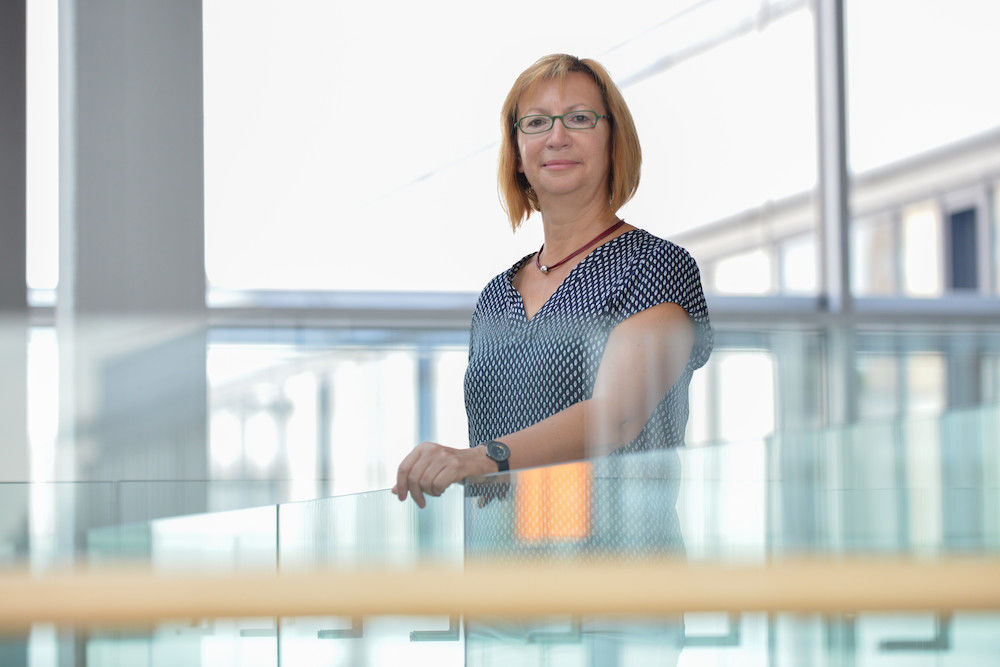“We cannot afford to slip up”

The rat is made of plastic and must still be held properly. “It is really important to know how to handle an animal properly,” says Heike Weinert. She doesn’t compromise. To learn this, you start by practising on models like this rat.
Replace, reduce, refine – the 3R principle is the standard for all animal testing and for Heike Weinert’s work. Animal testing? Yes. But only if it is absolutely necessary. The use of animals for scientific purposes can only be justified ethically if the expected gain in knowledge justifies the burden on the animals in the experiment. And in fact: “We use fewer animals at the University today.”
This is also due to the work of Heike Weinert, who arrived at the University of Halle in 1986 after studying biology for five years in what was then Soviet Kishinev (today Chişinău, Republic of Moldova). The Weissenfels-native works in zoology with small rodents and insects and knows the animals very well. However, there was no regulated animal protection in the GDR. However, at the beginning of the 1990s the requirements changed. In 1992, Heike Weinert became the University’s first Animal Welfare Commissioner and still is today. She provides advice and training, and checks applications. She is also the interface to the Veterinary Inspection Office (supervisory authority) and the State Administration Office (licensing authority).
She remained a passionate part-time employee in the Animal Physiology Department at the Institute of Biology until November 2018. When the corresponding position of Animal Welfare Commissioner at Faculty of Medicine needed filling, she did not hesitate for long and took on the role.
“But if it only involved sitting at my desk, I wouldn’t do it,” says the 56-year-old, who has worked for a long time training students. As Animal Welfare Commissioner, she travels a lot and frequently revisits sites to see how the test animals are kept and whether this is done correctly. It is not only about mice and rats in the laboratory, which are what most people think of when they hear the words animal testing, and which are the most commonly used at the University. Dogs, cats and primates are, of course, not used for testing. However, there are farm animals, which are kept by the University in Merbitz (Saalekreis). Horses, pigs, sheep and poultry are essential for teaching and research in agricultural and nutritional sciences. This mainly concerns feeding experiments.
Animal welfare and research
The Animal Protection Act is the legal basis for the work of animal protection commissioners in Germany. Animal testing on vertebrates is generally subject to authorisation. The most important premise is to keep pain, suffering or damage to animals to a minimum. The 3Rs principle – replace, reduce, refine – is the top priority when it comes to research using animal testing. Anyone can search the database www.animaltestinfo.de to find out which animal experiments have been approved by the state authorities. It is located at the Federal Institute for Risk Assessment (BfR). Further information on this topic can be found on the portal www.tierversuche-verstehen.de, which is jointly run by Germany’s major scientific organisations.
In addition to on-site visits and consulting services, Heike Weinert, together with veterinarians and scientists, trains everyone who wants to perform animal experiments: “Anyone who wants to work on animals needs a certificate of competence. No one is allowed to do anything to the animal without having taken appropriate courses beforehand,” she says. These are students, PhD students and ultimately any scientist who conducts experiments with animals. She also continues her own training regularly. “It’s the only way,” she says. She also checks how competent those who carry out animal testing are. The certificate, once issued, is not a carte blanche. And so the plastic rat is used again and again.
“As an academic institution, we cannot afford to slip up,” says Heike Weinert. And they don’t either. “Public interest in animal welfare is generally very high,” she says. And rightly so. She does not believe that it will be possible to completely dispense with animal experiments in the future, despite many developments that partly replace animal testing: “In medical research in particular, for example in cancer research, the effects on the entire organism must be taken into consideration.” Attempts to limit it to individual organs do not work. “But you can reduce the number of tests. Today, many in vitro experiments series are carried out before any in vivo work is carried out.” This means you work as much as possible in the test tube before animals come into play.
Heike Weinert is not working on this topic in Halle alone; the University cooperates with the Fraunhofer Institute for Cell Therapy and Immunology IZI, among others, and organises further training courses with veterinarians. Heike Weinert is a member of the Animal Welfare Advisory Board of the State of Saxony-Anhalt and was also Chairwoman of the Committee of Animal Welfare Commissioners in the Society of Laboratory Animal Science for ten years. During this time, she also worked on establishing a nationwide further training programme for animal welfare commissioners. “It is being offered for the 12th time this year and is very well received,” says Weinert, who has her sights set on something new for MLU once again. “We offer a range of further training for all those who work on animal testing and now want to invite guest scientists to look specifically at topics such as substitute and supplementary experiments to convey possibilities that exist outside of animal testing.”
Heike Weinert
Animal Welfare Commissioner
Telephone +49 345 55-71466
Mail: tierschutz@verwaltung.uni-halle.de
